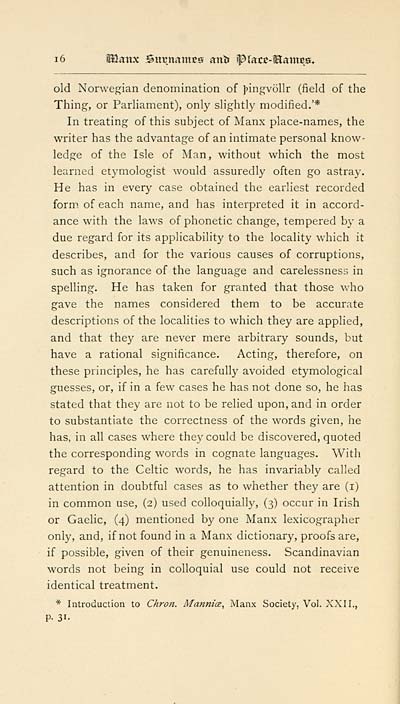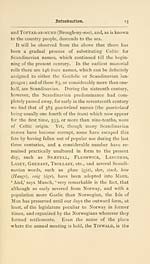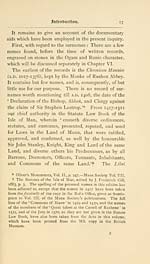Download files
Complete book:
Individual page:
Thumbnail gallery: Grid view | List view

1 6 Manx SwttnamBs anb ^late-iaamjte.
old Norwegian denomination of Jnngvollr (field of the
Thing, or Parliament), only slightly modified.'*
In treating of this subject of Manx place-names, the
writer has the advantage of an intimate personal know-
ledge of the Isle of Man, without which the most
learned etymologist would assuredly often go astray.
He has in every case obtained the earliest recorded
form of each name, and has interpreted it in accord-
ance with the laws of phonetic change, tempered by a
due regard for its applicability to the locality which it
describes, and for the various causes of corruptions,
such as ignorance of the language and carelessness in
spelling. He has taken for granted that those who
gave the names considered them to be accurate
descriptions of the localities to which they are applied,
and that they are never mere arbitrary sounds, but
have a rational significance. Acting, therefore, on
these principles, he has carefully avoided etymological
guesses, or, if in a few cases he has not done so, he has
stated that they are not to be relied upon, and in order
to substantiate the correctness of the words given, he
has, in all cases where they could be discovered, quoted
the corresponding words in cognate languages. With
regard to the Celtic words, he has invariably called
attention in doubtful cases as to whether they are (i)
in common use, (2) used colloquially, (3) occur in Irish
or Gaelic, (4) mentioned by one Manx lexicographer
only, and, if not found in a Manx dictionary, proofs are,
if possible, given of their genuineness. Scandinavian
words not being in colloquial use could not receive
identical treatment.
* Introduction to Chron. Mannice, Manx Society, Vol. XXII.,
P- 31.
old Norwegian denomination of Jnngvollr (field of the
Thing, or Parliament), only slightly modified.'*
In treating of this subject of Manx place-names, the
writer has the advantage of an intimate personal know-
ledge of the Isle of Man, without which the most
learned etymologist would assuredly often go astray.
He has in every case obtained the earliest recorded
form of each name, and has interpreted it in accord-
ance with the laws of phonetic change, tempered by a
due regard for its applicability to the locality which it
describes, and for the various causes of corruptions,
such as ignorance of the language and carelessness in
spelling. He has taken for granted that those who
gave the names considered them to be accurate
descriptions of the localities to which they are applied,
and that they are never mere arbitrary sounds, but
have a rational significance. Acting, therefore, on
these principles, he has carefully avoided etymological
guesses, or, if in a few cases he has not done so, he has
stated that they are not to be relied upon, and in order
to substantiate the correctness of the words given, he
has, in all cases where they could be discovered, quoted
the corresponding words in cognate languages. With
regard to the Celtic words, he has invariably called
attention in doubtful cases as to whether they are (i)
in common use, (2) used colloquially, (3) occur in Irish
or Gaelic, (4) mentioned by one Manx lexicographer
only, and, if not found in a Manx dictionary, proofs are,
if possible, given of their genuineness. Scandinavian
words not being in colloquial use could not receive
identical treatment.
* Introduction to Chron. Mannice, Manx Society, Vol. XXII.,
P- 31.
Set display mode to: Large image | Transcription
Images and transcriptions on this page, including medium image downloads, may be used under the Creative Commons Attribution 4.0 International Licence unless otherwise stated. ![]()
| Early Gaelic Book Collections > Blair Collection > Surnames & place-names of the Isle of Man > (34) |
|---|
| Permanent URL | https://digital.nls.uk/82100056 |
|---|
| Description | A selection of books from a collection of more than 500 titles, mostly on religious and literary topics. Also includes some material dealing with other Celtic languages and societies. Collection created towards the end of the 19th century by Lady Evelyn Stewart Murray. |
|---|
| Description | Selected items from five 'Special and Named Printed Collections'. Includes books in Gaelic and other Celtic languages, works about the Gaels, their languages, literature, culture and history. |
|---|

